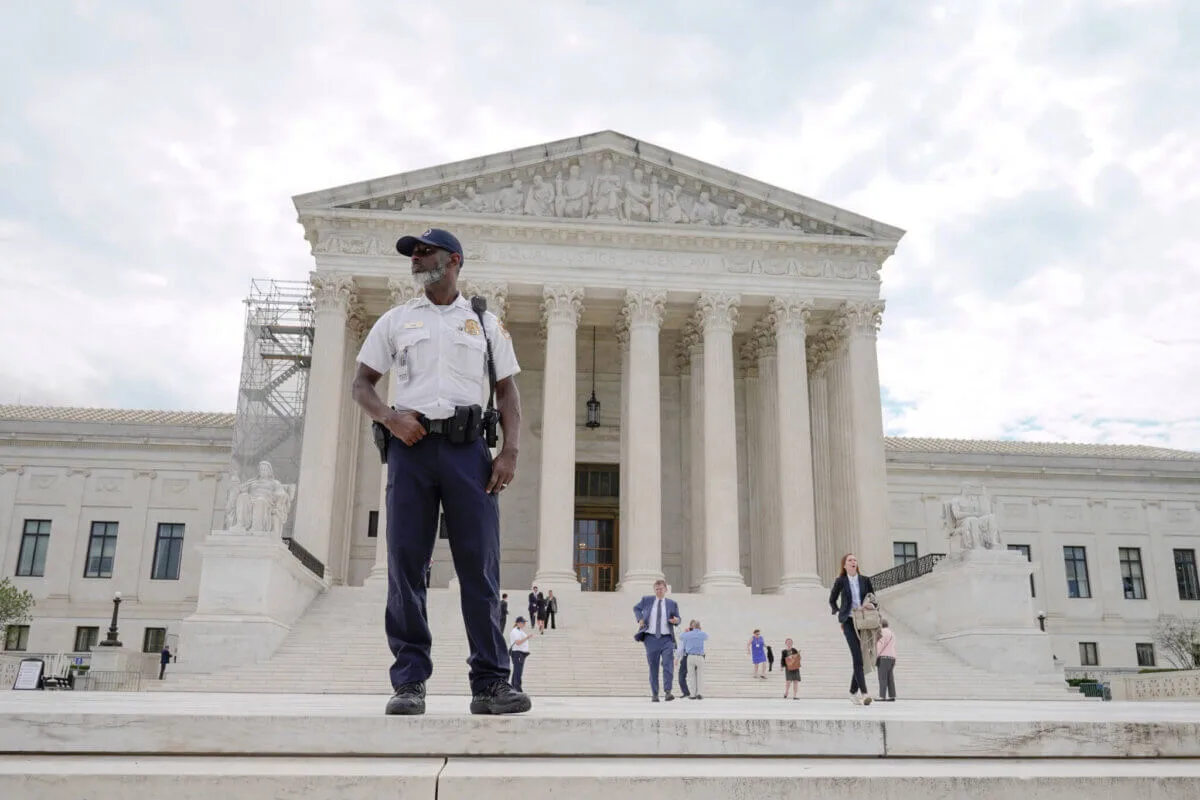
A police officer stands outside of the U.S Supreme Court, Tuesday, June 27, 2023, in Washington. (AP Photo/Mariam Zuhaib)
The theory is based on a reading of the Constitution that would give state legislatures total authority to to pass voter suppression laws, gerrymander electoral maps, and even potentially overturn election results—without any oversight from the courts, governors, or election administrators.
The US Supreme Court on Tuesday rejected a fringe legal theory that was embraced by former President Donald Trump’s allies during his effort to overturn the 2020 presidential election.
In a 6-3 ruling, the Court declined to embrace the “independent state legislature theory”—an extreme reading of the Constitution that would have eroded America’s system of checks and balances and turned election laws upside down.
The theory is based on a reading of the Constitution that would give state legislatures total authority to set laws regulating federal elections, an interpretation which would effectively allow partisan politicians to pass voter suppression laws, gerrymander electoral maps, and even potentially overturn election results—regardless of limits set by state constitutions and without any oversight from the courts, governors, or election administrators.
The theory, which emerged out of the ashes of the 2000 presidential election, gained traction after the 2020 election, when Trump and his allies embraced it to try to overturn his loss. Some of Trump’s legal advisors cited the theory and argued that it gave legislatures the power to refuse to certify the election results and instead select their own slate of electors.
The Supreme Court refused to intervene in cases related to the 2020 election that cited the theory, and on Tuesday, rejected the most extreme version of the theory. In the majority opinion, Chief Justice John Roberts affirmed that while state legislatures clearly have the authority to enact election laws, state courts also have the authority to review those laws and determine if they are legal under state constitutions.
The US Constitution “does not exempt state legislatures from the ordinary constraints imposed by state law,” Roberts wrote, adding that state elections legislation is still subject to judicial review.
Some legal experts advised caution, however, with Richard Pildes, a leading scholar of constitutional law, noting that Roberts wrote that “state courts may not transgress the ordinary bounds of judicial review,” without providing a standard for what “transgress[ing]” would be.
Roberts also noted that federal courts “must not abandon their own duty to exercise judicial review,” effectively signaling that federal courts have the authority to override a state court’s interpretation of state laws regarding federal elections, if they believe state courts have gone too far in exerting their power.
Justices Clarence Thomas, Samuel Alito, and Neil Gorsuch dissented in the case.
The Court’s decision came in a case titled Moore v. Harper, relating to a congressional map drawn by the North Carolina Legislature that was rejected as a partisan gerrymander by the state’s Supreme Court. The Republican-controlled legislature appealed the decision to the US Supreme Court, arguing that only the legislature had authority over maps—not the courts.
The six-justice majority sided with the North Carolina Supreme Court, ruling the court was acting within its authority in concluding that the map was a partisan gerrymander under the state constitution.
Abha Khanna, an attorney for the plaintiffs and partner at Elias Law Group, celebrated the Court’s ruling.
“Today’s decision from the Supreme Court is a resounding victory for free and fair elections in the United States. The independent state legislature theory is a dangerous, fringe legal theory that has no place in our democracy,” Khanna said in a statement. “In its most extreme form, the Independent State Legislature Theory could have weakened the foundation of our democracy, removing a crucial check on state legislatures and making it easier for rogue legislators to enact policies that suppress voters and subvert elections without adequate oversight from state court.”
The Court’s ruling not only ensures that legislatures cannot simply discard the decision of voters, but is also likely to have consequences for states with gerrymandered congressional and state legislative maps. Since the Court affirmed that state courts have the right to judicial review of legislatures’ actions, it’s almost certain that congressional and legislative maps in several states will face new lawsuits.

VIDEO: Trump isn’t the only republican facing charges for alleged financial crimes
https://www.tiktok.com/@gandernewsroom/video/7361494909938978090 A whole lot of Michigan Republicans and lobbyists are facing criminal charges for...

VIDEO: It’s expensive to be poor in Michigan
https://www.tiktok.com/@gandernewsroom/video/7361154790300060974 Ever heard of predatory payday loans? Here’s how new laws could help protect...

Here’s everything you need to know about this month’s Mercury retrograde
Does everything in your life feel a little more chaotic than usual? Or do you feel like misunderstandings are cropping up more frequently than they...

The ’Gander wins multiple 2023 Michigan Press Association awards
MICHIGAN—The ’Gander Newsroom has earned multiple awards in the 2023 Michigan Press Association Better Newspaper Contest. The awards were announced...

Michigan Republicans ask Supreme Court to restrict medication abortion access
A lawsuit supported by Republicans could disrupt access to the most common form of abortion—even in Michigan, where reproductive rights are...




